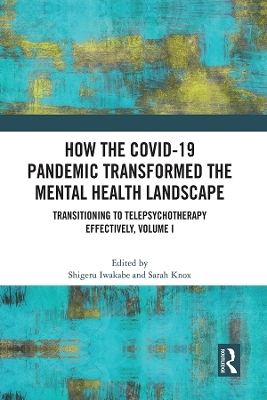
How the COVID-19 Pandemic Transformed the Mental Health Landscape
Routledge (Verlag)
978-1-032-39968-3 (ISBN)
This book is a valuable historical record of how counselling psychologists responded to the COVID-19 pandemic around the globe. Volume I includes 14 chapters that address topics associated with transferring counselling practice online. Several chapters focus on transitioning to online therapy from face-to-face contact, including the effect of such a transition on the therapeutic relationship, and working with clients’ emotional processes online.
Written by prominent researchers and clinicians in the field of counselling and psychotherapy, both the volumes together cover a wide range of perspectives and offer useful clinical recommendations related to effective telepsychotherapy practice. The chapters in these volumes were originally published as a special issue of Counselling Psychology Quarterly.
Shigeru Iwakabe is Professor of Clinical Psychology at Ritsumeikan University in Osaka, Japan. He conducts psychotherapy research on client emotional processes from an integrative perspective. His research interests include training and professional development in psychotherapy, case study research methods, psychotherapy integration, and cultural and social issues related to the practice of psychotherapy. Sarah Knox is Professor in the Department of Counselor Education and Counseling Psychology at Marquette University, Milwaukee, WI, USA. The vast majority of her research is qualitative, and specifically uses consensual qualitative research (CQR). She focuses primarily on the psychotherapy relationship and process, training and supervision, and advising relationships and processes.
Foreword: Marshall McLuhan and the therapeutic importance of the telephone Preface Part I: Transitioning to Telepsychotherapy 1. Telepsychotherapy: a leaflet for psychotherapists in the age of COVID-19. A review of the evidence 2. Transitioning to virtual programming amidst COVID-19 outbreak 3. Mental-health care under threat: a pragmatic approach for ethical decision-making for practitioners in COVID-19 4. Psychotherapy at a public hospital in the time of COVID-19: telehealth and implications for practice 5. A brief transdiagnostic pandemic mental health maintenance intervention Part II: Therapeutic Relationship 6. Cultivating online therapeutic presence: strengthening therapeutic relationships in teletherapy sessions 7. Repairing alliance ruptures using supportive techniques in telepsychotherapy during the COVID-19 pandemic 8. Grappling with our therapeutic relationship and professional self- doubt during COVID-19: will we use video therapy again? 9. When distance brings us closer: leveraging tele- psychotherapy to build deeper connection 10. A methodology to improve eye contact in telepsychotherapy via videoconferencing with considerations for psychological distance 11. Let’s face it: video conferencing psychotherapy requires the extensive use of ostensive cues Part III: Working with Emotions 12. Clinical recommendations for psychotherapists working during the coronavirus (COVID-19) pandemic through the lens of AEDP (Accelerated Experiential Dynamic Psychotherapy) 13. Work with emotions in remote psychotherapy in the time of Covid-19: a clinical experience 14. Emotion-focused and video-technology considerations in the COVID-19 crisis
| Erscheinungsdatum | 20.09.2024 |
|---|---|
| Verlagsort | London |
| Sprache | englisch |
| Maße | 174 x 246 mm |
| Gewicht | 430 g |
| Themenwelt | Medizin / Pharmazie ► Medizinische Fachgebiete ► Psychiatrie / Psychotherapie |
| Studium ► Querschnittsbereiche ► Infektiologie / Immunologie | |
| Sozialwissenschaften ► Soziologie | |
| ISBN-10 | 1-032-39968-6 / 1032399686 |
| ISBN-13 | 978-1-032-39968-3 / 9781032399683 |
| Zustand | Neuware |
| Informationen gemäß Produktsicherheitsverordnung (GPSR) | |
| Haben Sie eine Frage zum Produkt? |
aus dem Bereich


